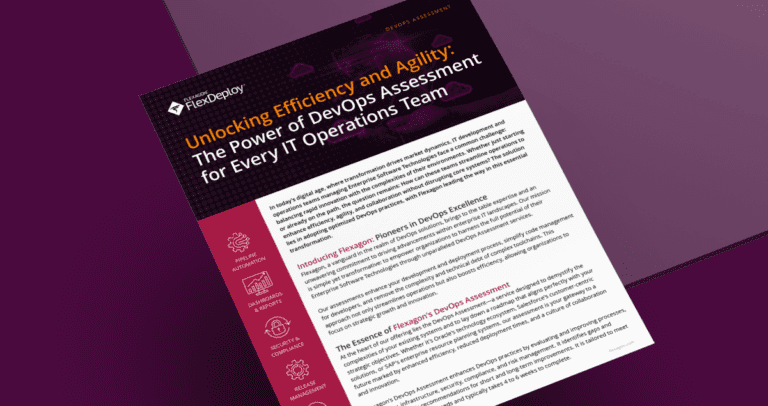A DevOps culture vastly improves the process of creating software. At the same time, there are challenges in making the transition. For example, the process of instilling the right values and processes isn’t obvious.
What is DevOps culture? Effectively, it’s the merging of development and operations (DevOps) into a joint IT team, resulting in an organizational change that boosts performance. Both sides communicate openly with each other, share overlapping work, and take responsibility for ensuring frequent high-quality releases. As security is a focus from the get-go, this approach is also known as DevSecOps.
Moving over to a DevOps culture requires an investment. However, the dividends are well worth the outlay. When you combine forces, and the whole organization adopts these modern practices, the system can take on a life of its own—rapidly zooming through releases.
Challenges of Adopting a DevOps Culture
Organizations tend to accumulate habits that become difficult to change. As a result, some time and effort may be required to switch from conventional IT methods to a DevOps culture. Nonetheless, the rewards of embracing a DevOps mindset far outweigh the costs of overcoming these obstacles.
One of the main hurdles is the adoption of automation—everywhere. When people are overly accustomed to their tasks, they might view automation as a threat instead of an opportunity. Automating tedious work remains one of the key ways in which DevOps accelerates software production.
Compliance poses a two-pronged threat to adopting a DevOps culture. On the one hand, it involves overhauling processes that may have been designed with compliance in mind. This can complicate the transition. Second, those opposed to the transition may argue that it will become more difficult to audit adherence.
With visibility from DevOps tools like FlexDeploy, you’re able to increase regulatory compliance instead of decreasing it. In addition, by starting your DevOps culture transition with a small team, you’re able to uncover a wider range of benefits while dealing more effectively with its challenges.
Another significant obstacle is working on tasks involving both development and operations. After being accustomed to seeing these as separate areas, it’s understandable for team members to keep viewing them as distinct from one another. Rather, employees should try to understand both sides of the equation and how they can work more closely together.
A framework called CALMS (Culture, Automation, Lean, Measurement, and Sharing) gauges an organization’s readiness for DevOps, as well as its progress during the transition. Enterprises that are only now moving to DevOps may struggle to visualize making the move along with being able to judge how far along they are in the process. Working on these five CALMS elements can help organizations realize their DevOps goals.
Why Collaboration is Key in DevOps
At its core, DevOps is about the communication and collaboration between development and operations teams. Ideally, they should work seamlessly as a united team. To encourage this, you might want to have your developers spend some time working directly among the operations team, and vice versa.
As much as it’s a different way of doing things, it’s also a different way of thinking. After all, you’re building a new culture in which dev and ops are no longer isolated but integrated into an all-inclusive DevOps entity. And because people may have developed an attachment to their previously prescribed duties, it’s important to ease them into the idea of sharing these tasks.
When there’s teamwork between development and operations, it fosters synergy. For example, you could present the fusion as an enlargement of employees’ responsibilities. Operations are involved right from the start of development, and development extends through to support.
It’s this collaborative culture that provides the DevOps difference. Once everyone understands how this approach benefits the business, they’ll be prepared to make the necessary changes. This should make it easier to shift the spotlight from development to delivering effective software.
Examining existing workflows also helps to identify which procedures are slower than others. This is a great opportunity to combine development and operations—and to automate processes. Experiments can tell you what boosts performance and what causes problems. DevOps culture embraces frequent, small releases, ensuring that you uncover any issues sooner rather than later.
As a leader in DevOps solutions, we offer a DevOps Assessment tailored to revolutionize your IT operations, ensuring you’re always a step ahead.

How DevOps Culture Improves Team Dynamics
Implementing a DevOps culture provides multiple benefits. First off, it improves the flow of information through your organization. And as each team has a stake in the entire project, you’ll also see far less of the “blame game.”
When team members communicate easily with each other, you’ll have more time to develop new features instead of struggling to get different groups on the same page. Continuous integration and delivery bring out a steady stream of advances. DevOps tools like FlexDeploy support this faster pace.

As teams cooperate with each other from the initial planning stage, software design can incorporate the broadest base of lessons. Building a better design steers projects toward creating software that fulfills users’ expectations and can scale well.
Further, by encouraging early testing and releases, DevOps culture brings development and operations closer. While developers can feel the pressure to keep uptimes high and time to resolution low, those in operations can see the need for developers to deliver as quickly as possible.
The specific structure of DevOps teams should reflect the organization’s situation—for example, the number of products they are working on. Dev and ops may work side-by-side, or they may function as a single team.
Regardless of which structure you choose, a DevOps culture entails sharing information and efforts. It helps if team members have some knowledge of both development and operations—but if not, they’ll learn from practice. A key ingredient for any team is a capable leader who’s able to advance the DevOps agenda.
The total effect of DevOps collaboration is to enhance operational efficiency, speeding up the process of eliminating bugs and supporting users. As a result, failed communications between two isolated teams will become a thing of the past.
Adopt a DevOps Culture With FlexDeploy
A DevOps culture and mindset prepares you to deliver faster and higher-quality releases. While some obstacles remain—such as automation—there are also tools to help you deal with these complexities. As the premier DevOps technology for Oracle EBS, Salesforce, and SAP, Flexagon’s FlexDeploy will help you solve these challenges.
FlexDeploy is a comprehensive, integrated, and secure platform that supports cloud migration and continuous innovation. Moreover, it lets you control the automation of building, testing, and deploying software. FlexDeploy provides speed, consistency, and visibility into effectively managing the development and delivery for all Enterprise Software Platform technologies, increasing developer productivity and operational efficiencies, lowering costs, and reducing security and compliance risk to optimize software delivery performance while optimizing the user experience.
Organizations from across the globe already rely on FlexDeploy to attain their DevOps goals. Request a demo today to find out how FlexDeploy can facilitate a DevOps culture for your team.



